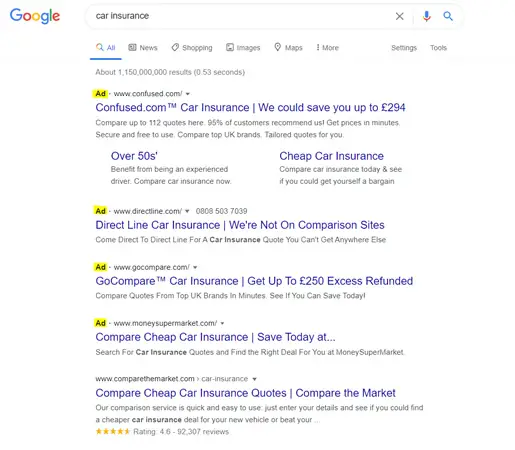Whether your business is brand new, or long established, getting an all-important boost in traffic and customers is critical to the success of your business.
In this post I will show you why you should be advertising your business on Google Ads, and what to look out for when specifically targeting a UK audience.
You could be trying different marketing techniques such as a Facebook page or search engine optimisation (SEO) but chances are if you’re new your Facebook page will look pretty much like a ghost town – with tumbleweeds drifting down the page – for a while to come.
Also, as seasoned SEO’ers (search engine optimisers) will know, gaining a first page position on Google can take several months of dedicated work.
Whilst you’re in it for the long game as far as marketing is concerned, advertising brings with it certain immediate rewards. It may cost you a little more, but profit is profit.
Plus, any customer could potentially share your business to their friends and family on social media, who in turn could share with their friends and family etc… don’t under-estimate the power of even just a few happy customers.
Advertising and marketing co-exist. Take a look at any magazine, especially local ones, and you’ll find an editorial piece on a subject with insights and help from a local expert and find a carefully positioned advert to said expert’s business on the following page.
That said the first baby step is a Google Ads campaign.
What is Google Ads?
For those of you unfamiliar with Google Ads, it’s predominantly how Google make their money. Over 5 billion searches made on Google per day. Yes 5 billion!
That’s nearly the equivalent of every single person in the world making a search on Google every 24 hours. This is also equivalent to 63,000 searches every second of every day, 24 hours a day.
It’s a mind-numbing amount to think about.
Google has a huge audience, and of course like any business listed on the stock exchange, they need to make money and continue to provide a healthy return for their investors.
When you search Google, it will show you what it believes is the best result for your search. There are a number of ways Google calculates this (which will leave for a more related search engine optimisation topic) but it does it and in lightening speed. Faster than we can blink most of the time.
You visit the website Google recommends and you’re off on your merry way. So how does Google make money?
Simple – they display ads.
As a user you may not even noticed the link you have clicked on is an ad that a company has paid to be at the top of the search rankings for you to see first. But this is the way Google works.

As you will see, Google does show you which results are adverts but if you’re quickly searching in need of something, the ‘ad’ sign can be missed. It’s not really highlighted in yellow, I have only highlighted the word in yellow to show you. In fact the first 4 results are adverts for the keyword ‘car insurance’ and it’s not until you reach listing number 5 do you see the first organic, non-paid for, result.
Simply put – Google ads is a way of a company appearing at, or towards, the top of the search results when particular words or phrased and search for.
How does Google Ads work?
Google Ads is considered to be the best place to advertise your business on the web.
It’s one of the most visited websites in the world, your ad is only shown to people who are searching for words or a phrase you have specifically chosen – and you only pay Google once your advert has been clicked, and someone comes to your website.
Now note you pay when your advert is clicked upon, not just when it’s shown. So, if it’s shown to 50 people and none of them click on your advert, you pay nothing.
That being said you also pay Google when someone clicks on your advert regardless of whether the make a purchase from you. So, if 50 people clicked on your advert, but none made a purchase, you would still have to pay Google for those 50 visitors.
Make sense?
It’s quite straight forward, but this is why it’s really important to get your advert and keywords right. If your advert doesn’t accurately explain what your service is, or you advertise on the wrong keywords, you’ll be paying for Google to send to your site people who may not be interested in what you have to sell.
For example, let’s say you are a graphic designer who designs logos for businesses, and want to advertise on Google to drive more traffic.
You wouldn’t want to advertise for the keyword ‘Design’. It may sound relevant but the people searching just the word ‘design’ could be looking for almost anything. They could be searching for designing jobs, or wanting ideas for a new kitchen design etc… Those type of people aren’t going to be interested in your logo design.
You could be more specific and advertise on the phrase ‘logo design’. Sounds promising, but again there are a lot of variants on ‘logo design’. It could be someone looking for a logo design job, or logo design clients. It could be a blogger who wants to use an online tool to create a basic free logo – or perhaps other logo designers looking for inspiration for their next client.
Advertising on a phrase such as ‘logo design for a small business’ although doesn’t guarantee the searcher may be looking for your services, it significantly increases the chances.
Your first start is to put together a list of keywords and phrases you would like to advertise on the first page of Google – and be sure that 80-90% of the people searching for those keywords would be potential customers.
If the percentage is lower than 80%, then it may be wise to fine tune your keywords and make them even more specific.
How much does it cost to advertise on Google Ads?
There isn’t an exact cost unfortunately. It varies.
It depends on how competitive your industry is (i.e. how many other businesses are also advertising for the same keyword) and how popular your adverts become.
You will pay more when there are more businesses wanting to advertise on the same keywords as you.
It’s also worth pointing out that you pay Google what’s known as a Cost Per Click (or CPC). This simply means you agree up front with Google how much you are willing to pay up to for each visitor.
This could be 50p per visitor, this may be up to £4+ or more per visitor. You set a maximum amount and Google will not charge you more than this amount per click.
So, why don’t you just set your maximum amount at 50p you may ask – well you can, but if a competitor tells Google they will pay 70p per visitor, they will often (but not always, as we will come on to in a minute) be shown above you.
If there are 5 or 6 competitors all paying more than 50p per visitor, that you are out ranked, and may not be visible at all until you increase your maximum amount.
You have to strike the right balance between being visible and not overpaying.
If for example you sell a product that brings you in a profit of £40 for each sale. Now let’s also say you have noticed that 1 in every 8 people, on average, that visit your website makes a purchase.
How much should your maximum amount be?
Well your conversion rate (the number of people who make a purchase vs the number of people visiting your site) is 12.5%.
If we calculate your profit of £40 per sale multiplied by your 12.5% conversion rate, this means you could spend up to £5 per visitor.
Now at £5 per visitor you will only ever breakeven and not make a profit, but if your maximum amount per visitor was set at £1.50, it means for every 10 sales your profit would be, on average £280.
This is calculated by 10 x sales = £400 revenue, but in order to achieve 10 sales you would need to pay Google for 80 people to visit (80 * £1.50 maximum amount) at a cost of £120.
Then minus £400 revenue by £120 cost and you have £280 profit.
It’s always best to start with as low a maximum amount as possible (10p-20p if possible) and test the water. Always look at how many people visit your website compared to how many people buy, and this will give you your all-important conversion rate.
I did mention a second factor. This is popularity and relevance. If people click on your advert and stay around, browse and buy, then Google know your website is highly relevant and what their visitor was looking for.
For those such websites Google will charge less for each visitor, because you are also the website the searcher was looking for.
If though your website wasn’t very user friendly, someone came to your website but then hit the back button to carry on their search, then Google will not see this favourable, and charge you more to advertise because it wasn’t what the searcher wanted.
Google places a massive emphasis on this.
In Conclusion and How to Get Started with Google Ads
I can’t recommend Google Ads enough, but you have to start with small amounts. Learn as you go. Don’t go advertising £500 straight away, start with £50 and try a bunch of keywords.
See which work and which do not. Get rid of the ones that don’t work, and if the conversions are good enough and you are making profit, then you can spend more on the keywords that do work.
Just because you think a keyword will work, doesn’t mean to say it will. It’s time to research, research and research before you lose money!
To get started with Google Ads visit the Google Advertising website for more details


